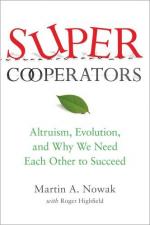|
This section contains 364 words (approx. 2 pages at 300 words per page) |
Altruism is the behavior of an individual that benefits others, it can in a number of circumstances be detrimental to the individual but of benefit to the group as a whole. There are many examples of altruistic behavior in biology. Grazing animals at risk from predators often employ members of the group to keep watch for predators. When a predator is sighted the individual sighting it lets out a warning to alert the other members of the herd. This warning is usually sufficient to save the lives of the majority of the animals involved but the individual giving the warning draws attention to itself, putting itself at greater risk.
Altruistic behavior is often more common amongst related individuals, the benefit that can be derived within a family group can, when viewed in one way be particularly great. Richard Dawkins argues that individuals are relatively unimportant and it is the survival of the genes that is of paramount importance. An individual is merely a group of genes acting together for convenience sake. Once a mating has taken place an individual will have 50% of the genes from each parent. If a parent were to sacrifice itself to save the life of a child of its own then 50% of the parents genes would survive. If the parent made the same sacrifice to save two of its children then two sets of 50% of its genes would survive (some of the same genes would be present in both individuals so it is not a case of 100% of the parents genes surviving). The closer the relationship the more genes they share, the more distant the relationship the smaller are the number of common genes. With the first example discussed the herd would be made of a number of individuals some with a close relationship to the animal giving the warning and some with very few genes in common. As a result of this the amount of risk involved in giving the warning is worth it. The increased level of risk to the individual is only slight but the potential benefit to common genes is large. This way of looking at altruism is known as the selfish gene hypothesis.
|
This section contains 364 words (approx. 2 pages at 300 words per page) |


